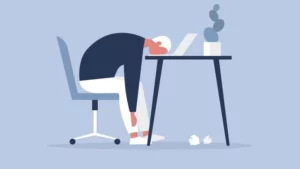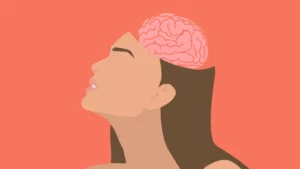We’ve all been there. You’re sitting in class, staring at the clock, and time seems to be moving at a snail’s pace. Or you’re at work, and the day just won’t end. You might even be at home, with nothing to do, and you feel like you can’t stand it one more second. What do all of these situations have in common? They are all examples of boredom. But did you know that boredom can lead to depression? In this blog post, we will discuss the connection between boredom and depression, and how one leads to the other.
Contents
Defining Depression
Depression is a mental disorder that is characterized by a persistent feeling of sadness or despair. It is more than just feeling down for a day or two, it can impact every aspect of your life. Depression can have various signs and effects that effects our physical, mental, emotional and cognitive health. It can have a negative effect on the way we think, feel, and also behave.
Depression has multiple causes. These can be biological, psychological, or social. Depression can also be caused by things like chronic stress, trauma, or even genetic factors.
Defining Boredom

Boredom, in the simplest words, is the feeling of being tired or restless because you are not doing anything interesting. It is the feeling of wanting to do something, but not having anything to do. People often experience boredom when they are stuck in a situation that they don’t want to be in, like a job they hate, or a class they find uninteresting.
Boredom is not a mental disorder, but it can lead to one. Studies have shown that boredom is a major factor in the development of depression.
Link Between The Two
Boredom and depression are often linked because they share a common cause: a lack of stimulation. When we are bored, it is because we are not being challenged or engaged in anything. This can lead to feelings of restlessness, frustration, and even despair. Depression, on the other hand, is caused by a variety of factors, but one of the most common is chronic stress. Stress can be caused by many things, but one major source is boredom. When we are bored, our minds are not being challenged and we can become stressed. This stress can then lead to depression.
Moreover, boredom can also lead to depression because it can make us feel like we are not doing anything with our lives. We can become trapped in a cycle of boredom and depression, where we are too depressed to do anything that would make us feel better, and so we stay bored.
This is a never-ending and often
How Does Boredom Lead To Depression?

There are a few ways that boredom can lead to depression.
- First, when we are bored, we are more likely to turn to unhealthy coping mechanisms, like drinking or smoking. These activities might make us feel better in the short term, but they can lead to long-term problems, like an addiction.
- Second, boredom can lead to a lack of social interaction. When we are bored, we tend to isolate ourselves and this can lead to feelings of loneliness and isolation.
- Boredom can cause us to ruminate on negative thoughts. When we are bored, our minds have nothing else to focus on except for our own thoughts. This can lead us to dwell on negative experiences from the past or worry about the future. All of these factors can contribute to the development of depression.
- Moreover, boredom makes time seem longer. This is because we are not engaged in anything and our minds are just wandering. This can lead to a feeling of hopelessness, as we feel like we will never be able to escape the boredom.
- Lastly, when we are not doing anything, it makes us prone to feeling lethargic, unmotivated, and even apathetic. All of these feelings can lead to depression.
All of these factors contribute to the development of depression.
How Does Depression Lead To Boredom?

If you already have depression, boredom can make it worse. Some ways this connection manifests include:
- First, when we are depressed, we tend to lose interest in the things we used to enjoy. This is because depression can cause a loss of pleasure in activities that were once enjoyable.
- Second, depression can make it difficult to concentrate or focus on anything. This means that even if we find something interesting, we might not be able to pay attention to it.
- Third, depression can lead to fatigue and low energy levels. This makes it hard to do anything at all, let alone something that requires effort or motivation.
- Moreover, depression can cause us to have negative thoughts about ourselves and our lives. This can make us believe that there is nothing worth doing, which leads to boredom.
- Lastly, when we are depressed, we might start avoiding social situations. This is because we might not want to be around people or be around anything at all. All of these factors can contribute to the development of boredom.
All of these links and correlations show how one can lead to the other in a vicious cycle.
Signs
Figuring out if you’re bored or depressed can be tricky, but there are some signs that can help you tell the difference.
If you’re bored, you might:
- Finding that nothing interests you
- Feeling like your time is wasted
- Not feeling satisfied with your life
- Losing motivation
- Being fidgety or restless
- Feeling like you’re in a rut
- Feeling like there’s nothing to do
- Being easily distracted
On the other hand, if you’re depressed, you might:
- Losing interest in activities you used to enjoy
- Having difficulty concentrating
- Experiencing fatigue or low energy levels
- Having negative thoughts about yourself or your life
- Avoiding social situations
Of course, it’s important to remember that these are just general signs and symptoms. If you’re worried that you might be suffering from boredom or depression, it’s always best to consult with a mental health professional.
Boredom and depression are two states of mind that can be difficult to differentiate between. However, there are some key signs and symptoms that can help you tell the difference. If you’re worried that you might be suffering from boredom or depression, it’s always best to consult with a mental health professional.
Causes
There are many different causes of boredom and depression. Some may be overlapping or similar. However, many may vary and be completely different. We will understand the possible reasons in detail.
For Boredom
As we saw, boredom is a state of mind where an individual is not engaged in any activity and is uninterested. The reasons for this state of mind can be plenty. Some of them are:
- Lack of stimulation: This is when we do not have anything to engage our minds in. This can be due to a lack of external stimuli or a lack of internal motivation.
- Uncertainty: This is when we do not know what to expect or what will happen next. We might feel like we are in a rut or that there is nothing to look forward to.
- Not having enough to do: This is a common cause of boredom. When we do not have enough to do, we can often get bored easily. This is because our minds are not being challenged and we are not being stimulated.
- Repetitive or uninteresting tasks: This is when we are doing the same thing over and over again or when we are not challenged by the tasks that we are doing. This can lead to boredom because our minds are not being engaged.
- Being bed-ridden: You might be chronically ill or injured and unable to do much. This can lead to boredom because you are not able to engage in activities that you once enjoyed. It can also be difficult to find things to do when you are limited in your movement.
- Not having control over your life: This can be due to many different factors such as being in a difficult situation or not having much choice in what you do. This can lead to boredom because you feel like you are not in control of your life and that there is nothing you can do to change it.
- Isolation: One can be isolated due to a number of factors such as being in a remote location or being cut off from social interaction. This can lead to boredom because you are not able to interact with other people and you might not have much to do.
- Burnout: This is when you are overwhelmed and stressed out from work or other commitments. This can lead to boredom because you do not have the energy or motivation to do anything else.
One may face one or more of these factors which can lead to boredom in life.
For depression
Depression is a serious disorder instead of a state of mind. It can happen due to a variety of reasons such as:
- A traumatic event or loss: This can be the death of a loved one, a divorce, or any other type of trauma. This can lead to depression because you are grieving and might not be able to cope with the change.
- Genetics: If you have a family history of depression, you might be more likely to suffer from it yourself. This is due to some hereditary factors as well as the environment that you grew up in.
- Hormonal changes: This can be due to puberty, menopause, or other hormonal changes in the body. This can lead to depression because of the changes in the brain chemistry.
- Brain chemistry: There are certain chemicals in the brain that can have an imbalance. This can lead to depression because it can affect your mood and how you think. Some neurotransmitters responsible for this include serotonin and norepinephrine.
- Side effects of certain medications: Some medications can lead to depression as a side effect. This is because they can affect the chemicals in the brain.
- Substance abuse: This can be due to alcohol, drugs, or other substances. This can lead to depression because it changes the brain chemistry and how you think.
- Other medical conditions: Some medical conditions can lead to depression. This is because the person is not able to do the things they enjoy and may feel bored. The person may also feel like they are a burden to others. Some examples include conditions such as stroke, heart disease, cancer, and Alzheimer’s disease.
- Low self-esteem: This is when we have negative thoughts and beliefs about ourselves. We might feel that we are not good enough or that we are worthless. This can lead to depression because we might start to believe that there is nothing worth doing.
These are all the possible connections between boredom and depression. It is important to remember that depression is a serious disorder and should not be taken lightly. If you are feeling depressed, it is important to seek help from a professional. There are many resources available to help you cope with depression. Boredom can be a difficult thing to deal with but there are ways to overcome it as well.
Consequences
The troublesome and sometimes painful emotions caused by boredom might make you think that it is not a big deal. However, research has shown that there are some consequences that associate with chronic boredom. These include:

- Increased risk of developing anxiety and depression: This is because boredom can lead to a lack of motivation and interest in life. This can make you more susceptible to developing anxiety and depression.
- Higher chance of substance abuse: This is because people who are bored might turn to drugs or alcohol to try and relieve their boredom.
- Greater risk for accidents: This is because people who are bored might take risks or engage in risky behaviors to try and find something interesting to do.
- Decrease in productivity: This is because people might not have the right kick or motivation to do anything. This can lead to a decrease in productivity at work or school.
- Increase in health problems: People might not take care of themselves if they face frequent or chronic boredom. They might not exercise, eat healthily, or get enough sleep. This can lead to various health problems such as obesity, heart disease, and diabetes.
- Depletion in social life: This is because people who are bored might not want to socialize. They might isolate themselves from friends and family.
These consequences show that boredom can have a negative impact on your life. It is important to find ways to cope with boredom so that you can avoid these consequences.
Tips To Deal
Now that we know the signs, causes, as well as consequences of boredom, let’s take a look at some tips on how to deal with it. You can learn to do this by yourself through self-care strategies, or seek help from a mental health professional.
Self Help Strategies

Self-help is when you help yourself without involving anyone else. This can be done in many ways, such as:
- Changing your routine: This can be helpful if you find that you are bored with your current routine. Try doing something different each day or week. This can be anything from taking a different route to work to trying a new hobby.
- Finding new interests: If you feel like you have nothing to do, it might be because you haven’t found your interests yet. There are many things out there for you to explore. Try attending events or joining clubs related to activities that interest you.
- Spending time with friends and family: Spending time with loved ones is a great way to combat boredom. You can catch up on life and have fun while doing it.
- Doing something for yourself: This can be anything from taking a relaxing bath to reading your favorite book. Do something that makes you happy and relaxes you.
- Investing in yourself: This can involve taking courses, learning new skills, or reading self-improvement books.
- Journaling: Writing in a journal can help you to express your thoughts and feelings. This can be a great way to release boredom.
- Going out: You may do this by yourself, or with someone else. Go out and explore your city or town. Visit new places, attend festivals, or go on road trips. You can also sign up for day trips or weekend getaways.
- Utilizing resources: There is a variety of tools such as apps, websites, books, and articles that can help you find things to do. These can be things like recipes, workout routines, blog posts, or articles about your interests. They may help you feel more engaged and interested.
- Volunteering: This is a great way to give back to your community and meet new people. It also provides a sense of purpose.
- Staying physically active: Including some form of activity can help reduce boredom. This doesn’t mean that you have to go to the gym every day. Taking a walk or going for a bike ride are also great options.
- Practicing self-love: This is the most important thing you can do for yourself. Learn to love and accept yourself for who you are. This will help you be happier and less bored with life.
These are just some of the many self-help strategies that you can use to deal with boredom. Try out different ones and see what works best for you. Boredom is often seen as a negative emotion. But it doesn’t have to be. Boredom can lead to creativity and new experiences. It is important to find ways to cope with boredom so that it doesn’t turn into something more severe.
Professional Help

If you find that you are struggling to cope with boredom on your own, it might be time to seek help from a mental health professional. A therapist can help you understand the root of your boredom and develop strategies to deal with it. Some of the most common therapy approaches may include:
- Cognitive-behavioral therapy: This approach focuses on changing the negative thinking patterns that may be causing your boredom.
- Interpersonal therapy: This approach focuses on your relationships and how they may be affecting your boredom.
- Psychodynamic therapy: This approach explores the unconscious thoughts and feelings that may be causing your boredom.
- Narrative therapy: This approach focuses on the stories you tell yourself about your life. It helps you to identify the parts of your story that are causing boredom.
- Solution-focused therapy: This approach focuses on finding solutions to the problems that are causing your boredom.
- Expressive therapy: This approach uses creative outlets such as art, music, or writing to help you express your emotions. It can ease boredom and help you find new ways to express yourself.
- Animal-assisted therapy: This approach uses animals to help you feel more relaxed and ease boredom. This involves activities such as petting animals or taking them for walks.
No matter what approach you choose, therapy can be a great way to deal with boredom. It can help you understand the emotions you are feeling and develop healthy coping mechanisms. If you think therapy might be right for you, reach out to a mental health professional today.
Conclusion
In conclusion of the above, it’s evident that boredom and depression have very closely links. It’s easy to see how one can lead to the other, but with the right coping mechanisms in place, it is possible to deal with both boredom and depression effectively. There are a variety of self-help strategies that can be used to deal with boredom. You may also seek aid from a mental health professional if you find that you are struggling to cope on your own. No matter what route you choose, remember that help is available and you are not alone.
For more information, please contact MantraCare. Depression is a mental illness characterized by persistent feelings of sadness, hopelessness, and loss of interest in daily activities. If you have any queries regarding Online Depression Counseling experienced therapists at MantraCare can help: Book a trial Depression Therapy session


